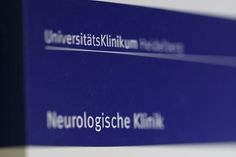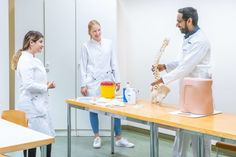-
Molecular Neuroimmunology Group | AG Molekulare Neuroimmunologie
- About us | Über uns
- DONATIONS | SPENDENKONTO
- Staff | Mitarbeiter
- Clincial studies | Klinische Studien
- Multiple sclerosis | Multiple Sklerose
- MOG antibody-associated disease (MOGAD) | MOG-Enzephalomyelitis (MOG-EM)
- Neuromyelitis optica spectrum disorders (NMOSD) / Neuromyelitis-optica-Spektrum-Erkrankungen
- Autoimmune encephalitis and paraneoplastic neurological syndromes / Autoimmunenzephalitiden und paraneoplastische neurologische Syndrome
- COVID-19/SARS-CoV-2 and Post-/Long-COVID | COVID-19/SARS-CoV-2 und Post-/Long-COVID
- Baló's concentric sclerosis (BCS) / Konzentrische Sklerose Baló
- Schilder's myelinoclastic diffuse sclerosis (MDS) | Myelinoklastische diffuse Sklerose (Morbus Schilder)
- History of neuroscience | Geschichte der Neurowissenschaften
- Immunoneuropathies
- Other research topics | Sonstige Forschungsschwerpunkte
- Neuroinflammation & Degeneration
- DFG Forschergruppe 2289
- Neuroinfectiology
NEUROIMMUNOLOGY PROGRAM
Program
Our expertise is the research on causes of multiple sclerosis (MS) and autoantibody-associated neuroimmunological disorders such as neuromyelitis optica spectrum disorders (NMOSD), myelin oligodendrocyte glycoprotein-associated disease (MOGAD), autoimmune encephalitis (AE)/autoimmune cerebellar ataxia (ACA), paraneoplastic neurological syndromes (PNS), and Susac syndrome (SuS). . The program focuses on the translation of basic research into clinical practice (bench to bedside) through national and international multi-center studies developing novel, targeted therapies. The neuroimmunological outpatient clinic (led by Prof. Dr. Brigitte Wildemann) has been certified as a ’recognized MS Center’ by the German Multiple Sclerosis Association (DMSG).
STRATEGY
In recent years, the Neuroimmunology program gained essential stimuli with regard to structure, basic science, and patient care. Along with the departments of Neurooncology and General Neurology, the respective Neuroimmunology programs have also been joined, creating synergies in various areas. In 2023, we treated >200 inpatients, >2000 outpatients and >300 patients in the infusion outpatient clinic, often as part of clinical studies.
The program collaborates closely with the clinical neighboring disciplines Neuroophthalmology, Neuroradiology, Neuropathology and Immunology, as well as the neurobiological groups on the campus. It ranges from experimental studies in animals to basic immunological and neurodegenerative mechanisms of MS and optic neuritis, cerebrospinal fluid analytical, imaging, immunoregulatory mechanisms in MS, the pathophysiology of autoantibody-mediated diseases of the CNS such as NMOSD, MOGAD, AE/ACA, SuS, and PNS, and experimental intervention studies in MS and NMOSD. These strategies will help to implement new diagnostic and therapeutic concepts directly into patient care. The Neuroimmunology team is committed to pass on latest findings and insights to colleagues (“MS-Update“, annually in September) and patients (annual MS Patient Day in January) in the Rhein-Neckar region.
-
Molecular Neuroimmunology Group | AG Molekulare Neuroimmunologie
- About us | Über uns
- DONATIONS | SPENDENKONTO
- Staff | Mitarbeiter
- Clincial studies | Klinische Studien
- Multiple sclerosis | Multiple Sklerose
- MOG antibody-associated disease (MOGAD) | MOG-Enzephalomyelitis (MOG-EM)
- Neuromyelitis optica spectrum disorders (NMOSD) / Neuromyelitis-optica-Spektrum-Erkrankungen
- Autoimmune encephalitis and paraneoplastic neurological syndromes / Autoimmunenzephalitiden und paraneoplastische neurologische Syndrome
- COVID-19/SARS-CoV-2 and Post-/Long-COVID | COVID-19/SARS-CoV-2 und Post-/Long-COVID
- Baló's concentric sclerosis (BCS) / Konzentrische Sklerose Baló
- Schilder's myelinoclastic diffuse sclerosis (MDS) | Myelinoklastische diffuse Sklerose (Morbus Schilder)
- History of neuroscience | Geschichte der Neurowissenschaften
- Immunoneuropathies
- Other research topics | Sonstige Forschungsschwerpunkte
- Neuroinflammation & Degeneration
- DFG Forschergruppe 2289
- Neuroinfectiology






